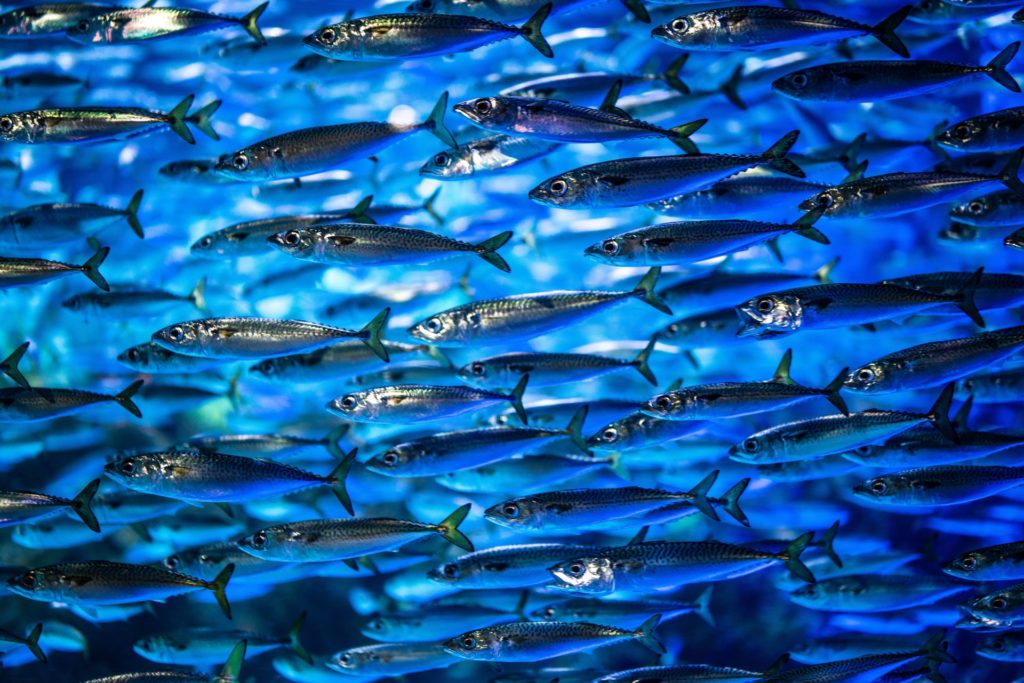Cold spells can harm ecosystems, but they can also provide critical respite in warming oceans
17 March 2022

As the oceans warm, marine cold spells — a cold snap in the water — are becoming less frequent and less severe, according to a new study in the AGU journal Geophysical Research Letters.
Credit: Fengyou Wan/Unsplash
AGU press contact:
Rebecca Dzombak, [email protected], +1 (202) 777-7492 (UTC-5 hours)
Contact for the researchers:
Yuxin Wang, University of Tasmania, [email protected] (UTC+11 hours)
WASHINGTON—Marine cold spells are cold versions of heat waves: periods of exceptionally cold water, able to hurt or help the ecosystems they hit. As the atmosphere and oceans warm, marine cold spells are becoming less intense and less frequent overall, according to a new study.
Today, the oceans experience just 25% of the number of cold spell days they did in the 1980s, and cold spells are about 15% less intense, researchers found. Weaker cold spells could mean they’re less likely to cause mass die-off events, but having fewer cold spells also means refuges and recovery periods from marine heat waves are disappearing.
The study was published in the AGU journal Geophysical Research Letters, which publishes short-format, high-impact research with implications spanning the Earth and space sciences. It is the first study to quantify and compare the changing nature of marine heat waves and cold spells over several recent decades on an oceanwide, global scale.
“Recently, studies have focused on heat waves and warm ocean temperature events, less so the cold events,” said lead author Yuxin Wang, an ocean and climate scientist at the University of Tasmania. Because marine cold spells have both positive and negative impacts, Wang said, understanding when, where and why these spells occur is critical for predicting their presence in the future. Predicting cold spells could be important for fisheries’ long-term planning and for ensuring catch limits are sustainable.
“Extreme events, either warm or cold, can bring an ecosystem to the edge,” said Sofia Darmaraki, a physical oceanographer at the National and Kapodistrian University of Athens who was not involved in the study. “Establishing the oceans’ baseline climatology and sensitivity of heat waves and cold spells to temperature changes, like they did in this study, is a burning question for the community.”
Marine heat waves, like heat waves over land, are natural phenomena becoming more frequent and intense in some places as a result of anthropogenic climate change. Similarly, marine cold spells are natural, but their rates are changing around the world. Over the past decade, cold spells have occurred roughly 10 days per year globally, a notable drop from about 40 days per year in 1985.
To understand when and where marine cold spells occur and how those patterns have changed over time, Wang and her colleagues analyzed sea surface temperature data from 1982 to 2020, checking for periods of either extremely hot or cold temperatures. They found the oceans are warming, corresponding to global warming trends, and sea surface temperatures are becoming variable over time. That variability leads marine heat wave and cold spell intensities to change at different rates, complicating scientists’ attempts to predict each.
Establishing global trends in marine cold spells and their relationship to global warming is an important step, but further studies are needed to constrain regional and local effects, Wang said. Those local effects include impacts on fisheries, which can be positive or negative.
“Marine cold spells play dual roles in influencing ecosystems,” Wang said. “They can cause devastating impacts, like coral bleaching and mass mortality events. But cold spells can offset the impacts of heat waves.”
“Extreme events affect coastal communities and economies, but members of the public might not be aware of how they’re going to intensify in the future. We need to get the word out,” said Darmaraki. “Information about the underlying, physical causes of these extreme events can help improve forecasting, which can lead to the development of early warning systems. That information can be provided to fisheries and other stakeholders, and they can collaborate on the best adaptations, the best path forward.” The better communities know what to expect, the better they can prepare.
###
AGU (www.agu.org) supports 130,000 enthusiasts to experts worldwide in Earth and space sciences. Through broad and inclusive partnerships, we advance discovery and solution science that accelerate knowledge and create solutions that are ethical, unbiased and respectful of communities and their values. Our programs include serving as a scholarly publisher, convening virtual and in-person events and providing career support. We live our values in everything we do, such as our net zero energy renovated building in Washington, D.C. and our Ethics and Equity Center, which fosters a diverse and inclusive geoscience community to ensure responsible conduct.
Notes for Journalists:
This research study is published with open access and is freely available. Download a PDF copy of the paper here. Neither the paper nor this press release is under embargo.
Paper information:
“Understanding the Changing Nature of Marine Cold-spells”
Authors:
- Yuxin Wang (corresponding author), Jules B. Kajtar, Institute for Marine and Antarctic Studies, University of Tasmania, Hobart, TAS, Australia; Australian Research Council Centre of Excellence for Climate Extremes
- Lisa V. Alexander, Australian Research Council Centre of Excellence for Climate Extremes; Climate Change Research Centre, University of New South Wales, Sydney, NSW, Australia
- Gabriela S. Pilo, Institute for Marine and Antarctic Studies, University of Tasmania and Commonwealth Scientific and Industrial Research Organisation, Hobart, TAS, Australia
- Neil J. Holbrook, Institute for Marine and Antarctic Studies, University of Tasmania, Hobart, TAS, Australia, Australian Research Council Centre of Excellence for Climate Extremes